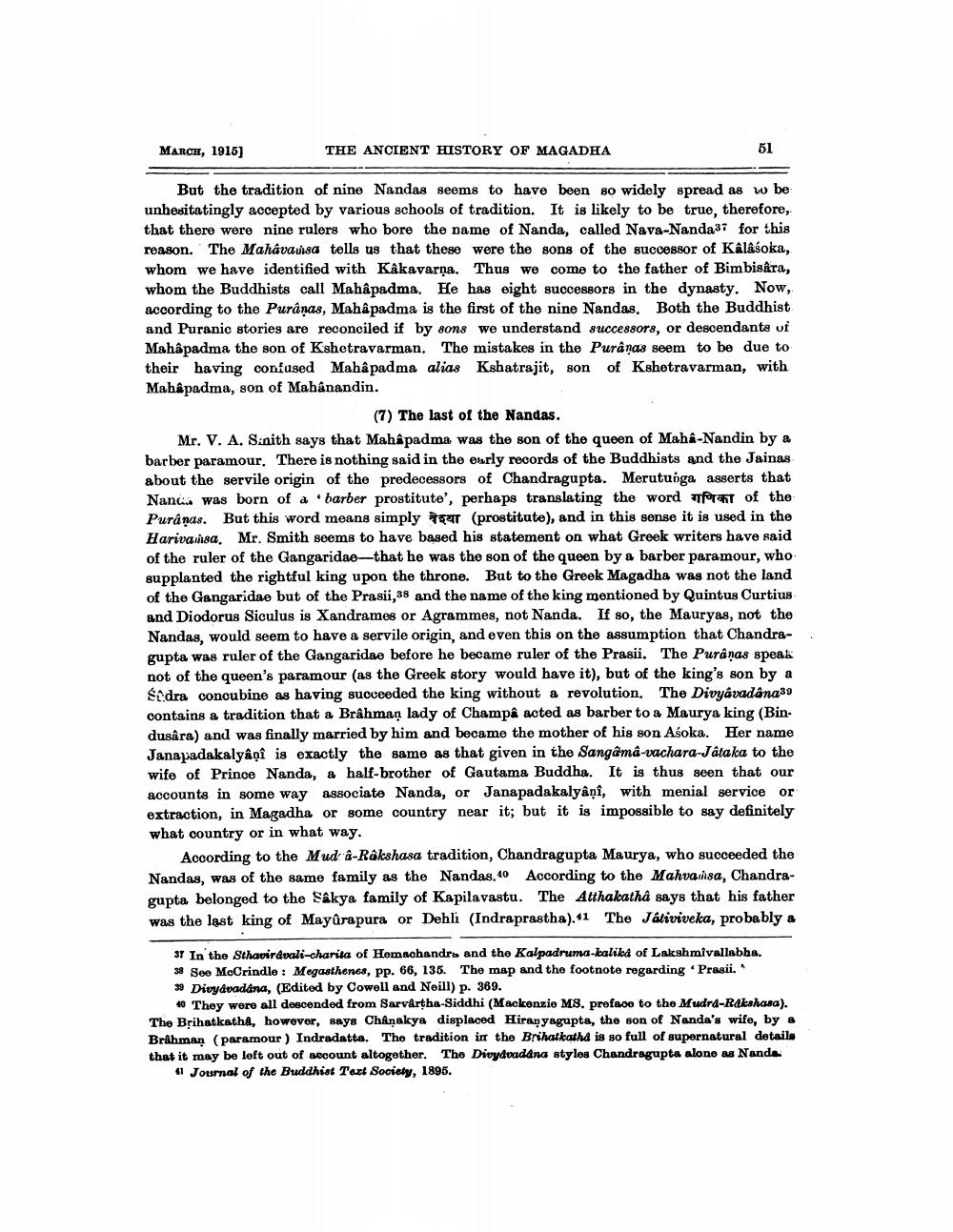________________
MARCH, 1915]
THE ANCIENT HISTORY OF MAGADHA
51
But the tradition of nine Nandas seems to have been so widely spread as to be unhesitatingly accepted by various schools of tradition. It is likely to be true, therefore, that there were nine rulers who bore the name of Nanda, called Nava-Nanda37 for this reason. The Mahavamsa tells us that these were the sons of the successor of Kâlâśoka, whom we have identified with Kâkavarna. Thus we come to the father of Bimbisâra, whom the Buddhists call Mahâpadma. He has eight successors in the dynasty. Now, according to the Puranas, Mahâpadma is the first of the nine Nandas. Both the Buddhist and Puranic stories are reconciled if by sons we understand successors, or descendants of Mahapadma the son of Kshetravarman. The mistakes in the Puranas seem to be due to their having confused Mahâpadma alias Kshatrajit, son of Kshetravarman, with Mahapadma, son of Mahanandin.
(7) The last of the Nandas.
"
Mr. V. A. Smith says that Mahapadma was the son of the queen of Mahâ-Nandin by a barber paramour. There is nothing said in the early records of the Buddhists and the Jainas about the servile origin of the predecessors of Chandragupta. Merutunga asserts that Nanda was born of a barber prostitute', perhaps translating the word for of the Puranas. But this word means simply r (prostitute), and in this sense it is used in the Harivansa, Mr. Smith seems to have based his statement on what Greek writers have said of the ruler of the Gangaridae-that he was the son of the queen by a barber paramour, who supplanted the rightful king upon the throne. But to the Greek Magadha was not the land of the Gangaridae but of the Prasii,38 and the name of the king mentioned by Quintus Curtius and Diodorus Siculus is Xandrames or Agrammes, not Nanda. If so, the Mauryas, not the Nandas, would seem to have a servile origin, and even this on the assumption that Chandragupta was ruler of the Gangaridae before he became ruler of the Prasii. The Puranas speak not of the queen's paramour (as the Greek story would have it), but of the king's son by a Stdra concubine as having succeeded the king without a revolution. The Divyavadana39 contains a tradition that a Brâhman lady of Champâ acted as barber to a Maurya king (Bindusâra) and was finally married by him and became the mother of his son Aśoka. Her name Janapadakalyani is exactly the same as that given in the Sangâmâ-vachara-Jataka to the wife of Prince Nanda, a half-brother of Gautama Buddha. It is thus seen that our accounts in some way associate Nanda, or Janapadakalyânî, with menial service or extraction, in Magadha or some country near it; but it is impossible to say definitely what country or in what way.
According to the Mud â-Rakshasa tradition, Chandragupta Maurya, who succeeded the Nandas, was of the same family as the Nandas, 10 According to the Mahvansa, Chandragupta belonged to the Sâkya family of Kapilavastu. The Atthakatha says that his father was the last king of Mayûrapura or Dehli (Indraprastha).41 The Játiviveka, probably a
37 In the Sthaviravali-charita of Hemachandra and the Kalpadruma-kalika of Lakshmivallabha. 38 See McCrindle: Megasthenes, pp. 66, 135. The map and the footnote regarding 'Prasii. 39 Divyavadana, (Edited by Cowell and Neill) p. 369.
40 They were all descended from Sarvârtha-Siddhi (Mackenzie MS. preface to the Mudra-Rakshasa). The Brihatkatha, however, says Chanakya displaced Hiranyagupta, the son of Nanda's wife, by a Brahman (paramour) Indradatta. The tradition in the Brihatkatha is so full of supernatural details that it may be left out of account altogether. The Divyavadana styles Chandragupta alone as Nanda.
41 Journal of the Buddhist Text Society, 1895.




